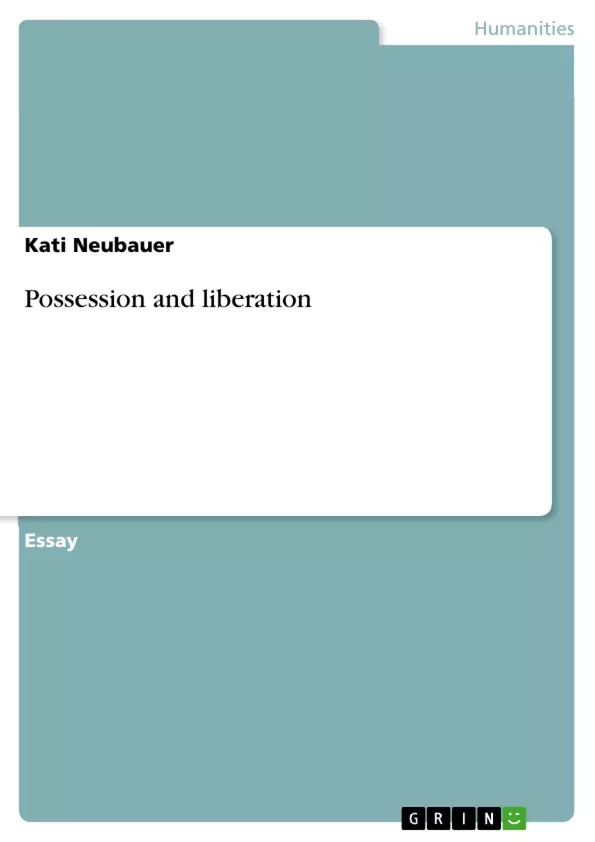In Hinduism religious practice is not limited to believing and praying, but can also cause the presence of a god in a human body. The phenomenon of being possessed by a god as a female individual will be discussed under the aspects what benefits the spiritual possession has for the women, and how this accepted religious act provides power for them as females in a patriarchal society.
Inhaltsverzeichnis (Table of Contents)
- Possession and Liberation
- Matammas
- Religious Institution of Matammas
- Matammas and Marriage
- Matajis
- Sudden Possession
- Characteristics of Possessed Women
Zielsetzung und Themenschwerpunkte (Objectives and Key Themes)
This text examines the phenomenon of spiritual possession by deities in Hinduism, focusing specifically on women who serve as mediums for these deities. The text aims to understand the benefits this practice provides for women, particularly in a patriarchal society, and how it allows them to gain power and independence. * **Spiritual Possession as a Pathway to Liberation:** The text explores how women who claim to be possessed by deities gain freedom from traditional societal expectations and obligations, particularly those related to marriage and family. * **The Role of Matammas and Matajis:** The text analyzes the roles of two specific types of women, Matammas and Matajis, who serve as mediums for deities. Matammas are married to village goddesses and act as intermediaries between them and the community, while Matajis experience sudden possession and often serve as healers and spiritual advisors. * **Power Dynamics and Gender Roles:** The text examines how spiritual possession challenges traditional gender roles and power dynamics within Hindu society, allowing women to assert their agency and voice. * **Social and Religious Implications:** The text explores the social and religious consequences of spiritual possession, including the impact on women's relationships, social status, and access to power and support networks.Zusammenfassung der Kapitel (Chapter Summaries)
The text begins by introducing the concept of spiritual possession in Hinduism, highlighting the role of women as mediums for deities. It then delves into the specific case of Matammas, women married to village goddesses who serve as intermediaries between the goddess and the community. The text discusses how this role allows Matammas to escape traditional gender roles and gain independence, while also exploring the potential complexities of their marriages. The text further examines the experience of Matajis, women who experience sudden possession by deities and often serve as healers and spiritual advisors. Similar to Matammas, Matajis are seen as challenging traditional gender roles and achieving a degree of freedom through their practice. The text explores how these women are perceived by society, highlighting the challenges they face while also emphasizing the benefits and support networks they gain through their spiritual roles.Schlüsselwörter (Keywords)
The text focuses on the key themes of spiritual possession, female agency, gender roles, and social liberation within Hinduism. It explores the unique positions of Matammas and Matajis, women who serve as mediums for deities and challenge traditional power structures. Other key concepts include traditional gender expectations, societal acceptance of spiritual practices, and the role of religious institutions in shaping women's lives.Frequently Asked Questions
What is spiritual possession in Hinduism?
It is a religious practice where a god is believed to enter and manifest within a human body, often serving as a medium for the community.
Who are the Matammas?
Matammas are women symbolically married to village goddesses, acting as intermediaries between the deity and the people.
How does possession provide power to women in a patriarchy?
As possessed individuals, women gain a sacred status that allows them to bypass traditional societal restrictions and assert agency.
What is the difference between Matammas and Matajis?
Matammas are part of a religious institution, while Matajis often experience sudden possession and serve as spiritual advisors or healers.
Does possession lead to social liberation?
Yes, for many women, it offers a way to escape traditional marital obligations and find a respected independent role within their social network.
- Quote paper
- Kati Neubauer (Author), 2008, Possession and liberation, Munich, GRIN Verlag, https://www.grin.com/document/133375



